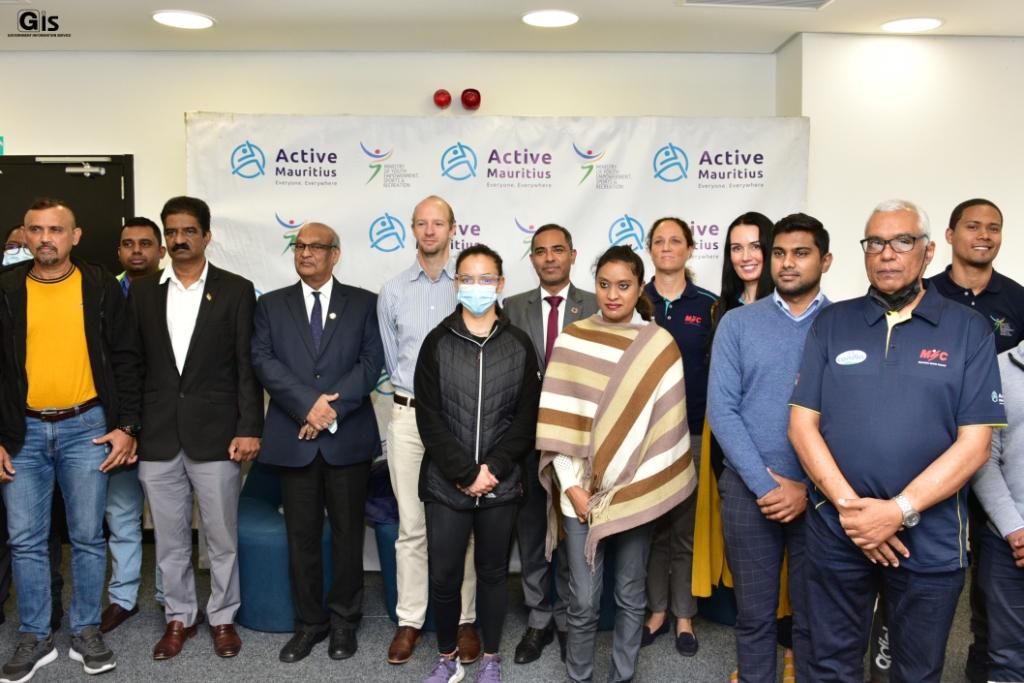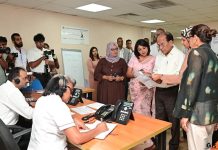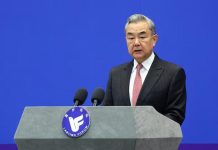Africa-Press – Mauritius. An Exercise Referral Consultant Training, being dispensed by the Training & Education Co-Lead, Advanced Wellbeing Research Centre, and Senior Lecturer in Physical Activity, Sport and Health from Sheffield Hallam University, United Kingdom, Ms Emily Newton, kickstarted, this morning, at Côte d’Or National Sports Complex.
This joint initiative of the Mauritius Sports Council (MSC) and the Ministry of Health and Wellness is being held in the context of the Exercise Referral Programme, launched on Wednesday 29 June 2022 at L’Escalier Mediclinic.
The objective of the Training is to deliver learnings on how to incorporate physical activity and exercise as a non-drug treatment prescription to non-Communicable diseases (NCDs), cancer, haemodialysis patients, as well as amputees.
It also seeks to establish useful links for the future expansion of this project in public and private sector, and to empower connection between these two sectors.
During her visit up to 9 August 2022, Ms Emily Newton will be holding a capacity-building workshop, whereby some 15 new Exercise Referral Consultants will be trained for the Exercise Referral Programme, its upscaling in more areas of the island and the extension of the Exercise Referral Programme to cancer and haemodialysis patients.
In his message, the Minister of Health and Wellness, Dr Kailesh Kumar Singh Jagutpal, underlined the prevalence of NCDs including diabetes type 2, hypertension, and obesity, as well as physical inactivity, cigarette smoking, and alcohol consumption among the population.
He asserted that his Ministry continuously carried out several sensitisation and prevention campaigns to protect the population against NCDs. The Minister stated that in line with the Government strategy to encourage each Mauritian to practise a physical activity, the MSC, Active Mauritius, together with the Health and Sports Ministries worked with the Exercise Referral Schemes on a pilot basis.
“The Exercise Referral Schemes,” he affirmed, “constitute a key point in the medical management of diseases.
A doctor prescribing physical activities instead of medications will not only reduce the burden on health institutions, but also empower individuals into a healthy lifestyle,” observed the Minister.
As for the World Health Organisation (WHO) Representative in Mauritius, Dr Indrajit Hazarika, he recalled that physical activity had significant overarching positive benefits on the health, body and mind, and contributed to manage and prevent NCDs as well as ensured healthy growth.
He indicated that people who were insufficiently physically active had 20 to 30% increased risk of death, and observed that if the level of physical activities was improved, 5 million deaths could be prevented each year.
The WHO Representative also spoke about the WHO New Global Action Plan on physical activity 2018-2030, launched in 2018, with the aim of increasing physical activity worldwide.
“It also seeks to encourage the whole community to adopt a system of response involving all stakeholders at the regional, local, international and global levels to provide safe and supported environments and more opportunities to help people increase physical activity,” he added.
Furthermore, he lauded the strong commitment of the Government in this endeavour. He stressed that the initiative would create the right setting and enabling environment for the country to achieve the agreed global target to reduce physical inactivity by 15% by 2030 as well as to align with sustainable development goals.
Also present on the occasion, the Chairperson of the MSC, Mrs Sarah Rawat Currimjee, underlined that this programme was part of the Active Mauritius Strategy and was in line with the national vision of the Government to promote physical activity among the population.
She called for everyone to become advocate of the cause and to help transmit the importance of physical activity to maintain a healthy lifestyle and as an opportunity for increased social interactions in the community.
She also highlighted the support of the Ministry of Health and Wellness in this endeavour and recalled that the young population was also being sensitised on the subject matter through the school system.
For her part, Ms Emily Newton underlined the importance of developing cardiovascular fitness to protect health. She emphasised that it was not easy to help people to be physically active with the way the world was changing and the technology was evolving.
“It is even more challenging,” she said, “to have people with long-term health conditions to engage in physical activities.
She also pointed out that Exercise Referral Schemes were poised to contribute to reduce blood pressure, improve Body Mass Index and enhance quality of life.
For More News And Analysis About Mauritius Follow Africa-Press







